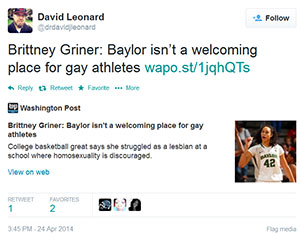 By J. Adrian Aumen, College of Arts and Sciences
By J. Adrian Aumen, College of Arts and Sciences
PULLMAN, Wash. – Disruption, dissatisfaction, complication … bad words in some classrooms are good words in David Leonard’s view.
Associate professor and chair of the Department of Critical Culture, Gender and Race Studies (CCGRS) at Washington State University, Leonard actually encourages his students to unlearn.
“I believe that much learning takes place from unlearning,” he said. “Too often we’re told that there are single answers or even simple solutions – that the goal of every conversation is to find clarity. For me, education is also about taking the known and complicating it, leaving us thinking differently about these assumed ideas.”
In classes examining the black freedom struggle or racism in African American films, for example, Leonard pushes students to challenge their assumptions about themselves, traditional education and the subject at hand.
“Once we have an answer, we need to ask more questions – to disrupt a level of complacency and satisfaction with a particular truth,” he said.
Enhanced teaching through tech
Among the first assumptions Leonard’s students learn to check is the value of written tests. Instead of giving exams, he often asks them to apply their new knowledge to projects that can reach a wider public. His students demonstrate critical thinking and intellectual transformation by creating websites, writing movie scripts and developing blogs and other multimedia presentations.
Such innovative technologies play a big role in Leonard’s teaching, scholarship and outreach. He uses a variety of online networking tools to communicate with students, alumni other scholars and the public. He brings prominent authors and experts into his classes via Skype and was among the first at WSU to integrate clicker technology into humanities-based courses.
A prolific blogger and tweeter, Leonard generates posts about current events that are frequently reposted on mainstream news and cultural discussion sites, from The Chronicle of Higher Education and The Huffington Post to Racialicious and The Feminist Wire. News outlets – both traditional and online – regularly seek him for expert commentary and to participate in virtual panels.
Outreach via social media
 “I am very active in social media because, to me, that’s where important conversations are taking place,” he said. “I want my work to connect, to reach people, to be accountable and to potentially have an impact. Social media allows me to break down certain barriers; it allows me to connect with other scholars and activists, artists and others who are engaged in these conversations.”
“I am very active in social media because, to me, that’s where important conversations are taking place,” he said. “I want my work to connect, to reach people, to be accountable and to potentially have an impact. Social media allows me to break down certain barriers; it allows me to connect with other scholars and activists, artists and others who are engaged in these conversations.”
He recommends social media not only to his students but to other faculty, as well.
“It takes our work into new spaces and allows for developing new relationships. In the classroom, it allows me to encourage students to connect their everyday practices with class. It also enables me to focus conversation in particular ways.
“I think ultimately it allows people to engage in important conversations and to build communities that are important to many people,” he said.
Intensity, commitment in teaching

Since joining the WSU faculty in 2002, Leonard has taught and/or developed numerous classes, from Introduction to Black Studies to Hip Hop around the Globe; Social Justice and American Culture; and Cultural Politics of Sport.
Yet much of his work takes place outside of the classroom. Students have often gathered in his office to discuss their studies, debate sports, history, or politics and receive guidance about their futures.
In 2013, the WSU College of Arts and Sciences honored Leonard with the William F. “Frank” Mullen Award for Excellence in Teaching, which recognizes outstanding educators for their involvement with undergraduate students in and beyond the classroom.
“David brings intensity and passion to everything he does,” said longtime CCGRS professor Richard King. “I have marveled at his creative capacity to put his commitment into action and engage in unexpected ways.”
Race informs research
An active researcher, Leonard’s interests encompass seemingly disparate topics, ranging from the prison industrial complex to the National Basketball Association. His work is linked through its commitment to examining the ways in which racial meaning is constructed, transformed, and challenged across time and space.
Leonard’s books include “Screens Fade to Black: Contemporary African American Cinema” and “After Artest: The NBA and the Assault on Blackness.” He has authored numerous articles and peer-reviewed publications. He is a regular contributor to NewBlackMan, Feminist Wire and Urban Cusp, and he has written for Ebony, Slam, Racialicious, Loop21, The Nation and The Starting Five.
A native of Los Angeles, Leonard earned his bachelor’s degree in black studies at the University of California, Santa Barbara, and his master’s and doctoral degrees in comparative ethnic studies from UC, Berkeley. He became chair of CCGRS in 2012 and continues to be instrumental in expanding and revising his department’s curriculum.
“My goals are always really simple: do good work, be accountable to the research and constituent communities, and produce work that has the potential to be impactful,” he said.
Check out Leonard’s blog at http://drdavidjleonard.com/. Follow him on Twitter @drdavidjleonard. Learn more about what makes him tick in “White Boy Remixed: Whiteness and Teaching Race” in NewBlackMan.